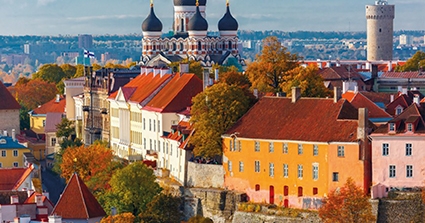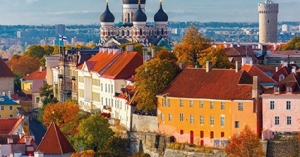T-Shirts and Furniture in Short Supply as Startups Boom in Estonia
In Estonia’s capital of Tallinn, today a leading global hub for tech startups, there is a massive temporary short supply of office equipment needed to furnish the growing number of coworking spaces and company headquarters in the city.
“We need hundreds of chairs for new employees, but even IKEAs in neighboring Latvia and Finland can only offer us a combined weekly supply of 20 chairs,” says Kaarel Kotkas, CEO of online identity verification company Veriff.
The supply problem, due to the rising number of employees that are basing themselves in the city every day, has also stretched to T-shirts; local producers are struggling to keep up with the growing demand for custom-made apparel with startup slogans and logos. Hence, there is a backlog in waiting times with local designer providers such as Reet Aus, whose certified brand of T-shirts are made from sustainable and recycled materials such as surplus industry materials.
“It can take up to 7 months to get shirts from Reet, since the demand is so high,” added Kotkas.
Tallinn today is home to the highest proportion of tech companies with valuations of over US$1 billion in per capita evaluation. Overall, there are currently around 550 startups in Estonia engaging in a variety of sectors ranging from FinTech to GreenTech and beyond. This startup growth reached a significant milestone in 2018, with the number of startup employees having grown by 26 percent from 2,981 people in 2017 to 3,763 last year.
“The challenge to fulfill the tremendous amount of furniture and T-shirts is probably a good one to have,” says Kaisa-Triin Kosenkranius from the Work in Estonia program. “There is strong market demand on both fronts, and this has been due, in no small part, to Estonia’s popularity as a tech talent destination.”
Boosting that popularity, are the biggest start-ups based in the city. Top 20 companies – which include likes of Veriff, Transferwise, and Taxify – collectively account for an astonishing 62 percent of new jobs created by startups in 2018. Veriff showed the biggest increase in percentage, with over 490 percent employee growth in their Estonian office. Last month, the company also announced that they had surpassed their 100-employee mark in all their offices and that they are looking to add 100 more people in the coming year.
“2018 was a renaissance for the new wave of Estonian startups. Funding was raised, bigger offices were built, and more people were hired. 2019 will therefore be the year of newcomers,” said Kotkas.
Indeed, data gathered by the Estonian Startup Leaders Club notes that startups in Estonia employ 581 people from abroad. Supporting this notion is the annual “Desirable Employer Survey of 2019” (conducted by CV Keskus), which point out that Estonian startups are among the top companies that people would like to work for, which – in addition to Veriff – also includes Cleveron and Starship Technologies. This clearly illustrates that start-ups are considered as an attractive work environment, not just among Estonians, but people from all corners of the world.
“After 3 years of living and working at the Bay Area in San Francisco, Estonia still beats most places to build an early phase start-up company; despite missing a local IKEA,” said Sten Tamkivi, CPO at global mobility company Topia and President of the Estonian Startup Leaders Club.
Estonia is ramping-up its drive to bring in more global tech talents to base themselves in Tallinn. The Work in Estonia program – an initiative by Estonia’s government – recently launched the second edition of its annual Career Hunt campaign, which identifies some of the world’s most promising tech talents and brings them to Estonia for free to give them a shot at working with the tech companies based there.
The Career Hunt program seeks to build on its success in 2018, whereby 5,500 people from around the world applied for a five-day free trip to Estonia. From that figure, 23 successful candidates landed face-to-face interviews and eight of them have already started work with the tech companies.
This year’s program will see 14 Estonian IT industry heavyweights participate in the initiative to find and nurture more talent. The companies include TransferWise, Monese, Veriff, Starship Technologies, Pipedrive, Thorgate Digital, Taxify, Malwarebytes, Finestmedia, Icefire, Alien Gain (petPawal), Swedbank Estonia, Genius Sports Services Estonia, and Mooncascade.
Combining the massive growth in startup funding – bolstered by the US$328 million received in investments last year – and the number of tech employees, Estonia’s startup scene is now more vibrant than ever. 2019 is set to continue this trend and the world will be looking forward to seeing what new innovations the country’s start-up scene will produce in the coming year.











